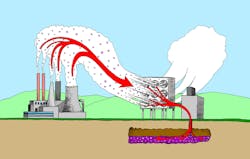US$110 Million for Carbon Capture, Utilization and Storage Projects
The U.S. Department of Energy’s (DOE’s) Office of Fossil Energy (FE) has announced approximately US$110 million in federal funding for cost-shared research and development projects under three funding opportunity announcements (FOAs). Approximately US$75M is for awards selected under two FOAs announced earlier this fiscal year; US$35M is for a new FOA.
These FOAs are an attempt to strengthen coal while protecting the environment. Carbon capture, utilization and storage (CCUS) is becoming widely accepted as a viable option for fossil-based energy sources—such as coal- or gas-fired power plants and other industrial sources—to lower their carbon dioxide (CO2) emissions, according to the DOE.
It has deployed various large-scale CCUS pilot and demonstration projects and wants to build upon the learnings to test, mature and prove CCUS technologies at the commercial scale. A recent study by Science of the Total Environment found that the DOE is the most productive organization in the world in the carbon capture and storage field.
“This administration is committed to providing cost-effective technologies to advance CCUS around the world,” said Secretary of Energy Rick Perry. “CCUS technologies are vital to ensuring the United States can continue to safely use our vast fossil energy resources, and we are proud to be a global leader in this field.”
“CCUS technologies have transformative potential,” said the assistant secretary for fossil energy, Steven Winberg. “Not only will these technologies allow us to utilize our fossil fuel resources in an environmentally friendly manner but the captured CO2 can also be utilized in enhanced oil recovery, which would help us maximize our energy production.”
Under the first FOA award, Front-End Engineering Design (FEED) Studies for Carbon Capture Systems on Coal and Natural Gas Power Plants, the DOE selected nine projects to receive US$55.4 million in federal funding for cost-shared R&D. The selected projects will support FEED studies for commercial-scale carbon capture systems.
Under the second FOA award, Regional Initiative to Accelerate CCUS Deployment, the DOE selected four projects to receive up to US$20 million in federal funding for cost-shared R&D. The projects also advance existing R&D by addressing key technical challenges; facilitating data collection, sharing and analysis; evaluating regional infrastructure; and promoting regional technology transfer. Additionally, this new regional initiative includes newly proposed regions or advanced efforts undertaken by the previous Regional Carbon Sequestration Partnerships (RCSP) Initiative.
Under the new FOA, Carbon Storage Assurance Facility Enterprise (CarbonSAFE): Site Characterization and CO2 Capture Assessment, the DOE is announcing up to US$35 million in federal funding for cost-shared R&D projects that will accelerate wide-scale deployment of CCUS through assessing and verifying safe and cost-effective anthropogenic CO2 commercial-scale storage sites, and carbon capture and/or purification technologies. These types of projects have the potential to take advantage of the 45Q tax credit, which provides a tax credit for each ton of CO2 sequestered or utilized. The credit was recently increased to US$35/metric ton for enhanced oil recovery and US$50/metric ton for geologic storage.
Projects selected under this new FOA shall perform the following key activities: complete a detailed site characterization of a commercial-scale CO2 storage site (50 million metric tons of captured CO2 within a 30-year period); apply and obtain an underground injection control class VI permit to construct an injection well; complete a CO2-capture assessment; and perform all work required to obtain a National Environmental Policy Act determination for the site.
The DOE’s National Energy Technology Laboratory will manage the selected projects.
